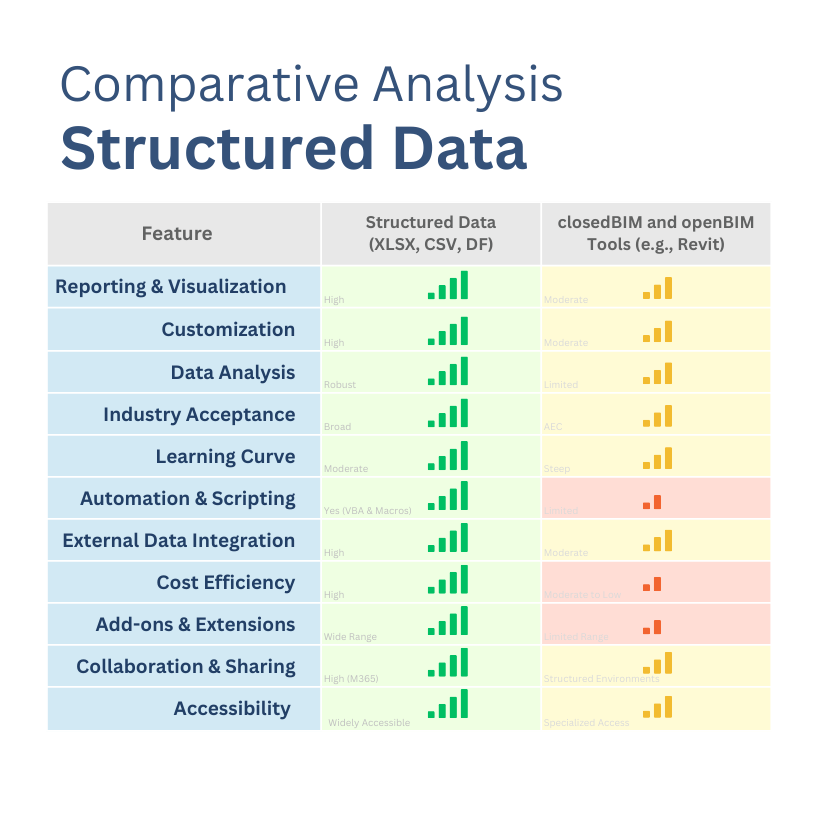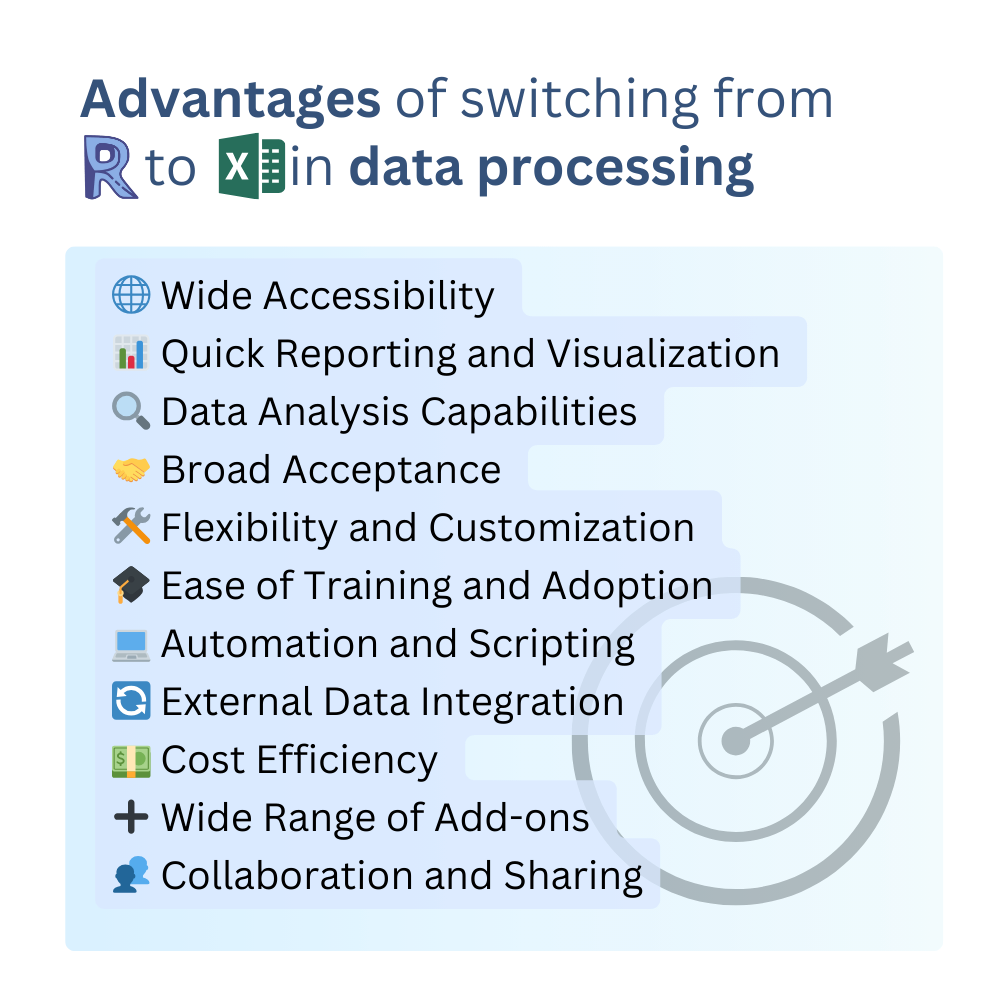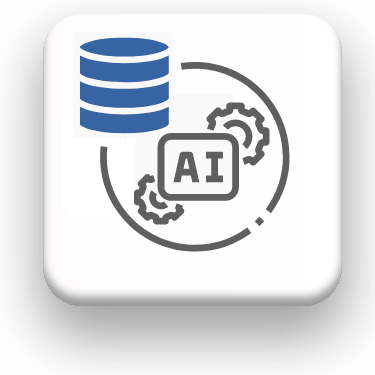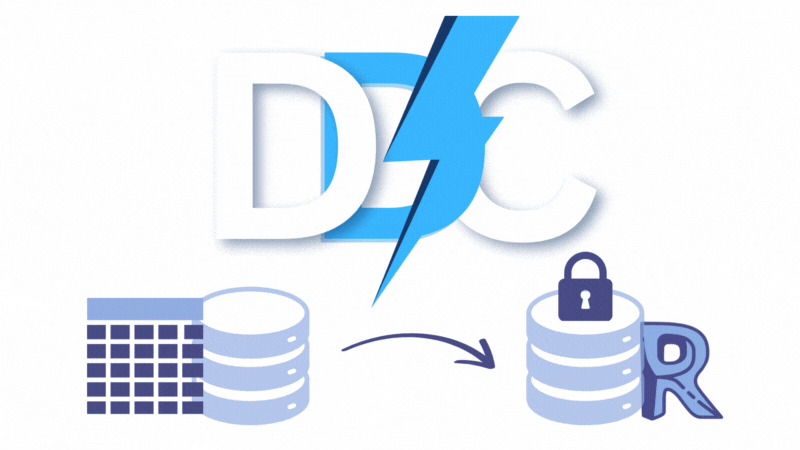FREE TOOL for extracting
DATA FROM REVIT® RVT
DataDrivenConstruction converter allows you to access your Revit projects and translate this data into popular and open format XLSX. Using the converter, without running Autodesk® tools and without using the Internet (without third-party libraries and plugins), we extract project data from RVT files and present the Revit database as a structured Excel table, where each row represents a specific project element (with its own identifier), and columns represent related properties and parameters.
SIMPLE DATA RETRIEVAL PROCESS
without having to install or run Revit® or any other vendor's CAD tools
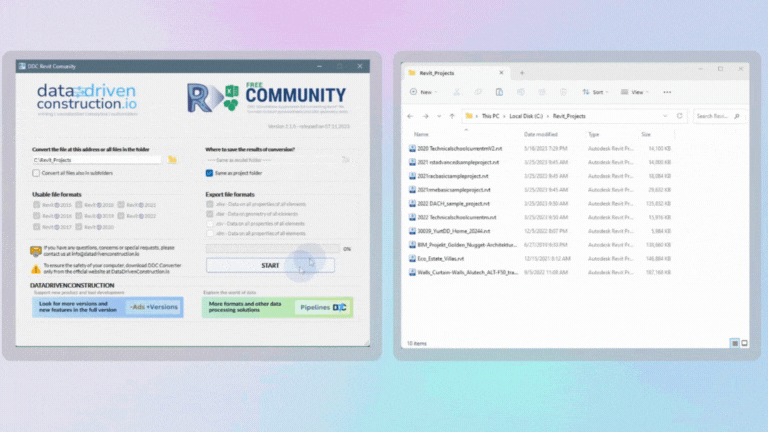
BENEFITS OF CONVERTING REVIT® TO EXCEL&DAE
Here are some of the key benefits
📊 Enhanced data visualization and manipulation
Easily visualize and manipulate Revit® data in Excel, making it more accessible for analysis and decision-making.
👥 Easy sharing of data with teams who may not have Revit® expertise
Simplify data sharing with non-technical team members, ensuring seamless collaboration.
📈 Streamlined data analysis and reporting capabilities
Excel's tools facilitate data analysis and report generation from Revit® drawings, aiding in project management and documentation.
🔄 Data Integration
Seamlessly integrate Revit® data with other software systems for improved workflow and data management.
📑 Customized Reports
Create tailored reports and summaries from Revit® data, including graphs and visualizations, to convey information effectively.
🤝 Collaboration
Foster collaboration by sharing Excel files with team members and stakeholders, regardless of their Revit® proficiency.
🔄 Version Compatibility
Overcome version compatibility issues and ensure data accessibility across various Revit® software versions.
🔍 Data Validation
Enforce data consistency and accuracy using Excel's validation features, reducing errors in Revit® data.
📊 Advanced Analysis
Utilize Excel's functions and macros to perform in-depth data analysis, calculations, and what-if scenarios.
📂 Data Archiving
Archive and preserve Revit® data in Excel for historical reference or compliance, ensuring secure storage.
🔍 Search and Filter
Effortlessly locate specific information within Revit® drawings, even in large and complex files, using Excel's search and filter functions.
💰 Cost Efficiency
Reduce licensing costs by allowing non-Revit® users to work with Revit® data in Excel, potentially saving on Revit® licenses.
📡 Accessibility
Excel files are smaller in size, making them easier to store, transfer, and work with, especially in low-bandwidth or storage-constrained situations.
📂 Data Backup
Excel versions serve as a backup for Revit® data, providing a valuable resource in case of data loss or corruption in the original RVT files.
👩💼 User-Friendly Interface
Excel's familiar and user-friendly interface simplifies working with Revit® data, reducing the learning curve for professionals.
THE RESULTS ARE REVIT® DATABASE
IN XLSX FORMAT
A DataFrame in XLSX form is a two dimensional table
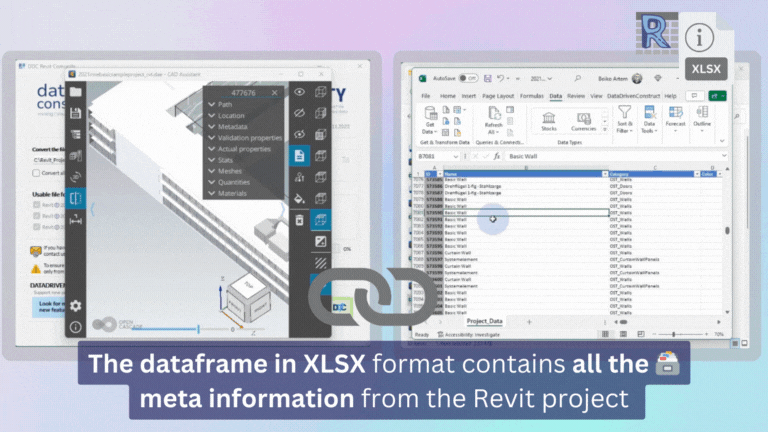
DataFrame - two dimension table
DataFrames, are used in Pipelines - a core component of many data analysis libraries, offer significant advantages for working with data
🚀 Efficient Data Management
DataFrames are optimized for handling large datasets, providing faster data manipulation.
🌐 Support for Heterogeneous Data
They can store different data types (like integers, strings, and floats) in various columns, ideal for real-world data.
🔍 Built-in Operations
DataFrames come equipped with numerous built-in methods for data filtering, sorting, and aggregating, simplifying complex data operations.
🔬 Ease of Data Exploration
Their tabular structure makes it easy to explore, analyze, and visualize data, aiding in quick data inspection and analysis.
🔗 Compatibility with Data Analysis Tools
They seamlessly integrate with various data analysis and visualization libraries, enhancing productivity in data science tasks.
📊 Advanced Data Integration
DataFrames easily interface with different data sources and formats, facilitating the integration and consolidation of diverse data sets.
OPTIONS FOR USING THE CONVERTER
Streaming file processing and embedding the conversion process in the code
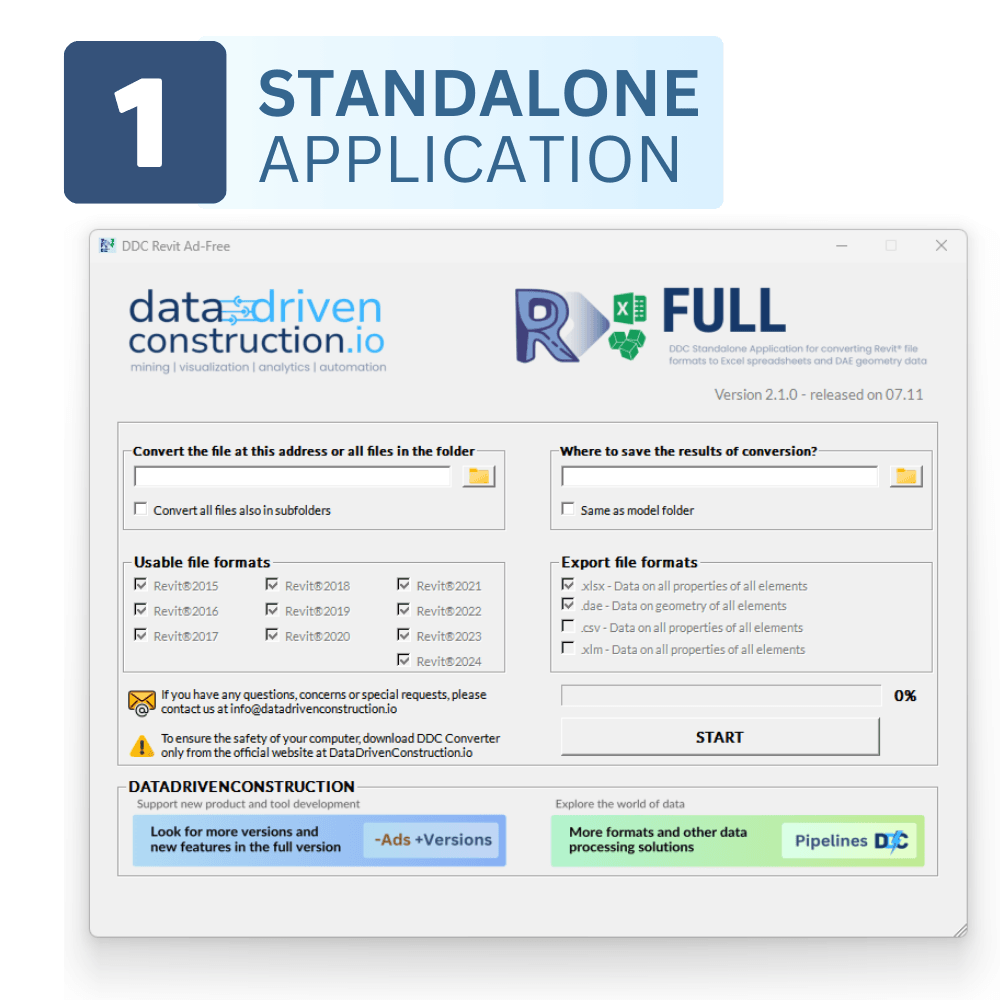
To extract data from REVIT®, the simplest tool is the DDC UI converter.
Start the conversion for RVT projects by specifying a folder 📁 with one or several RVT files. There's also an option to include files from subfolders 📂.
Click the "Start" button 🔘 to begin conversion. The results, Excel files 📊 with complete REVIT® file information, will be available in the specified folder.
The DDC terminal-based converter quickly extracts data from REVIT® RVT with minimal code.
To initiate the conversion in any folder, open Command Prompt or Power Shell 🖥️, and simply enter the path of the folder containing the DDC converter, followed by the path of the file to be converted 📂🔄.
# CMD or PowerShell > C:\DDC\RvtExporter.exe C:\Example.rvt

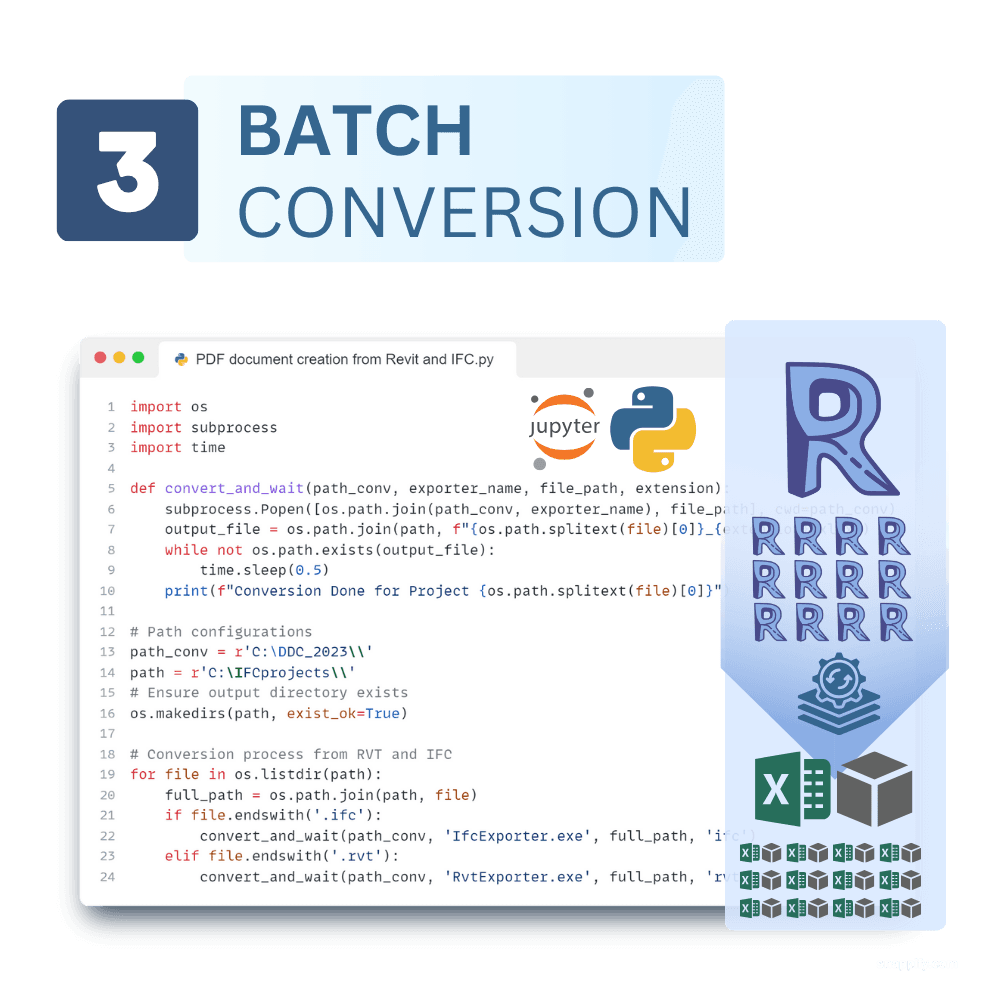
DDC Bulk Conversion
🔄 For handling large datasets simultaneously and automated processing
Enables conversion and management of substantial data volumes or integration of 💻🔗 the conversion process into workflow and data processing logic
import os
import subprocess
# Path to folder with RvtExporter.exe converter
path_conv = r'C:\DDC_2023\\'
# Path to folder with RVT projects
path = r'C:\RevitProjects\\'
def convert_and_wait(path_conv, exporter_name, file_path, extension):
subprocess.Popen([os.path.join(path_conv, exporter_name), file_path], cwd=path_conv)
output_file = os.path.join(path, f"{os.path.splitext(file)[0]}_{extension}.xlsx")
while not os.path.exists(output_file):
time.sleep(0.5)
# Conversion process from RVT and IFC
for file in os.listdir(path):
full_path = os.path.join(path, file)
if file.endswith('.rvt'):
convert_and_wait(path_conv, 'RvtExporter.exe', full_path, 'rvt')
USE REVIT® DATA IN A WIDE RANGE OF APPLICATIONS
Popular tools with large communities
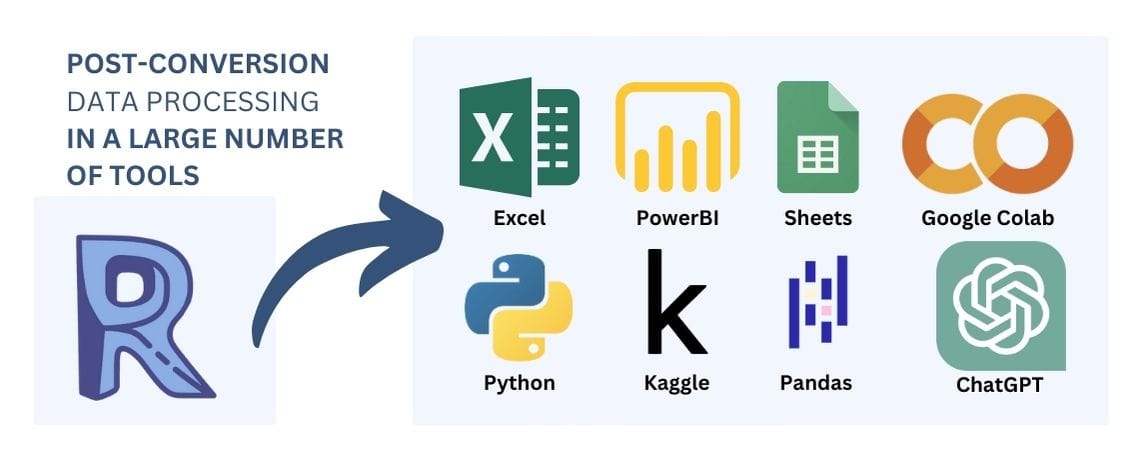
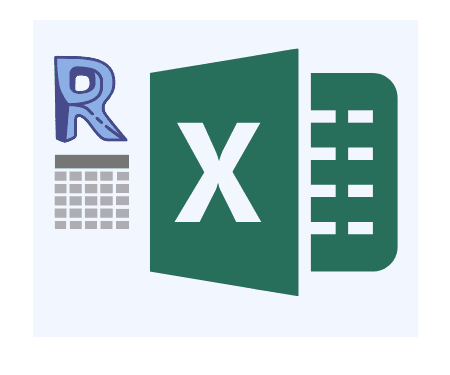
Microsoft Excel
A leading spreadsheet software that allows you to open, edit, and analyze XLSX files. It offers extensive features for data manipulation, analysis, and visualization.
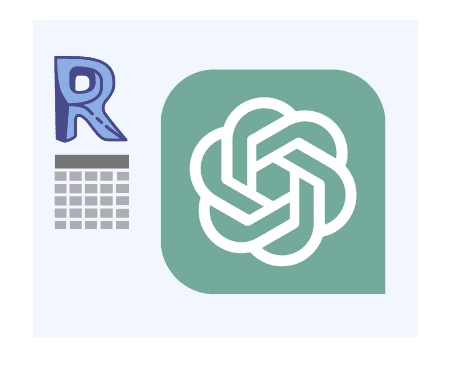
ChatGPT with Python Integration
This setup allows ChatGPT to use Python libraries like Pandas for handling XLSX files. Users can interact with and manipulate data in XLSX format through conversational commands, making it user-friendly for data analysis and visualization tasks.
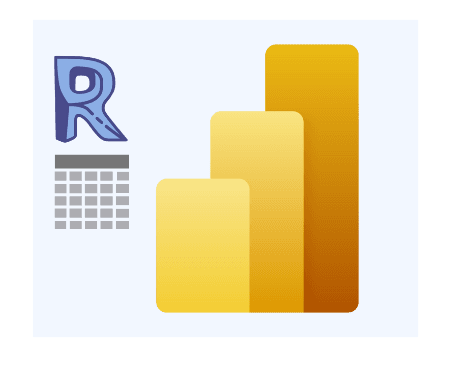
Power BI (Microsoft)
This business analytics tool not only imports XLSX files but also enables users to transform and model their data, creating interactive dashboards and reports that can be shared across an organization for insightful decision-making
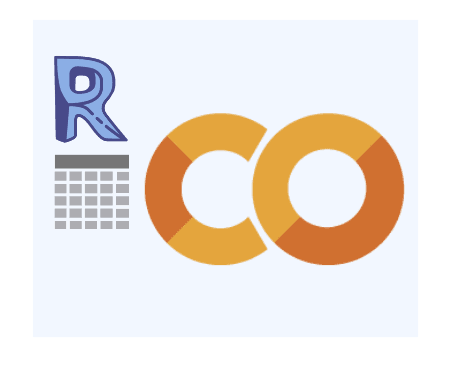
Jupyter Notebooks
An open-source web application that supports data cleaning and transformation, numerical simulation, statistical modeling, data visualization, and more. It can work with XLSX files through Python libraries like Pandas
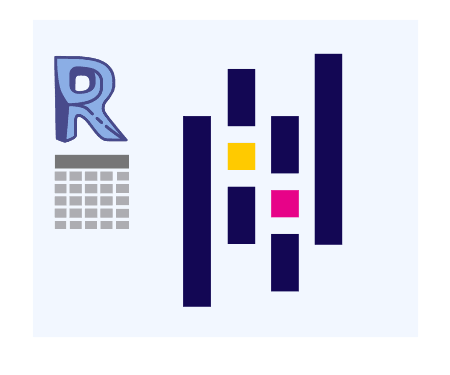
Pandas (Python Library)
A powerful data analysis and manipulation library for Python. Pandas can read and write DataFrames to and from XLSX files using its read_excel and to_excel functions.

Kaggle cloud-based work environment
It allows users to write and execute Python code, and it supports various Python libraries, including Pandas, for reading and writing XLSX files. Kaggle is widely used for data analysis and modeling, and it's an excellent platform for collaborative projects and learning from a community of data scientists.
AUTOMATION OF DATA PROCESSING
FROM REVIT® (IFC) PROJECT
📥 Example of automating data processing from a Revit® project on the Kaggle platform
FREE TOOL for extracting
DATA FROM REVIT® RVT
DataDrivenConstruction converter allows you to access your Revit projects and translate this data into popular and open format XLSX. Using the converter, without running Autodesk® tools and without using the Internet (without third-party libraries and plugins), we extract project data from RVT files and present the Revit database as a structured Excel table, where each row represents a specific project element (with its own identifier), and columns represent related properties and parameters.
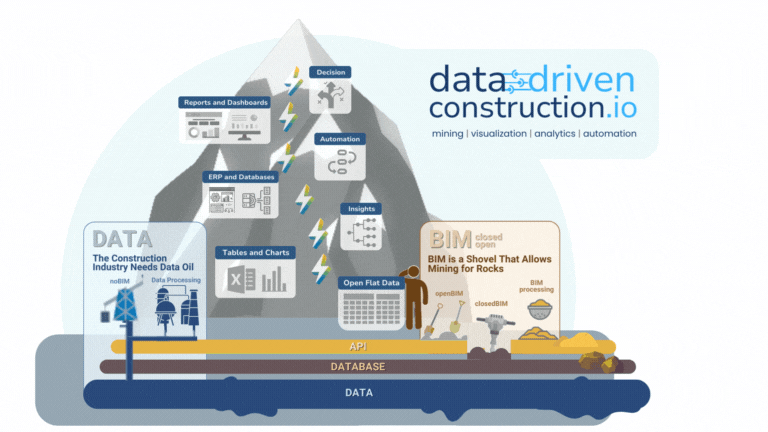

Every week, fresh solutions are released through our social channels
Don't miss the new solutions
Facing Issues? Reach Out!
Offer support for any troubleshooting or advanced use-cases




